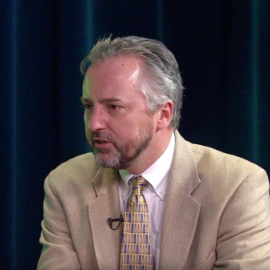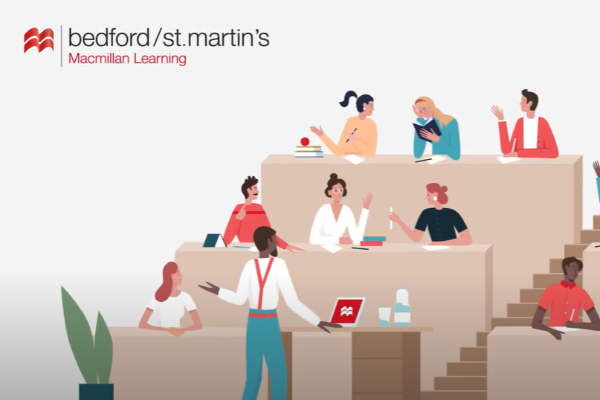Register Today!
Bedford English AI Webinar Series
Join us in April for a webinar series dedicated to exploring the impact of AI in the writing classroom.
On-demand
Perplexity AI: What We Can Learn about Writing by Watching Perplexity Consolidate Information
Dr. Richard E. Miller, Professor of English, Rutgers University
Perplexity was heralded by Hard Fork’s Kevin Roose as the search engine that will replace Google. Perplexity’s ability to consolidate information is an invaluable addition to every writer’s resources toolbox, but are there ways to stop it from becoming the tool that entirely takes over the student’s responsibilities for prose production? I’ve been actively teaching with technology for thirty years but, as exciting as I find the development of Perplexity to be, I am keenly aware that it points to a future that could be entirely written by AI. We are standing at an inflection point in history: if we embrace the challenges of teaching creative thinking now, we have the opportunity to preserve educational spaces where the act of writing is the practice of choice for human understanding and insight.
Our Writing Lives, Our Teaching Lives, and Generative AI: What’s a Caring Teacher to Do?
Dr. Mike Palmquist, Professor of English, Colorado State University
Generative artificial intelligence tools have been available to professionals for more than a decade, but recent breakthroughs have raised awareness of their potential impact on our design of assessments ranging from writing assignments to essay exams and multiple-choice quizzes and tests.
In this talk, Mike Palmquist, a scholar who has worked at the intersections of writing instruction and information technology since the early 1980s, considers the roles generative AI might play in our efforts to engage students more deeply in the content, processes, and frameworks explored in our courses. He argues that, while fears of an AI-apocalypse might be overblown, a great deal of thought will be required to not only address the disruptions associated with its increasing capabilities but also take advantage of its affordances.
Eyes Wide Open: Writing About AI Before Writing With AI
Dr. Miriam Moore, Professor of English, University of North Georgia
Is generative AI transformative, disruptive, apocalyptic, or something else? In this webinar, Miriam Moore introduces resources and strategies for writing about AI in composition classrooms, encouraging students—and faculty—to ask eight key sets of questions some of which include:
- What is generative AI—and is it actually “intelligent”?
- How are large-language models (AI bots) trained?
- Has AI ever been misused or abused?
- Could AI be a career choice for me? Or will AI just take away jobs?
Writing about these questions—and answering them—can support university stakeholders in making principled decisions for writing with AI technologies, both in the classroom and beyond.

Dr. Mike Palmquist
Professor of English, Colorado State University
Mike Palmquist is a professor of English and a University Distinguished Teaching Scholar at Colorado State University, where he has also served as Associate Provost for Instructional Innovation and Director of the Writing Center. He is recognized internationally for his work in writing across the curriculum, the effects of computer and network technologies on writing instruction, and new approaches to scholarly publishing.
He is the founding editor of the WAC Clearinghouse (http://wac.colostate.edu) and is the author of numerous articles and essays on writing across the curriculum and writing and teaching with technology as well as a member of the editorial boards of several journals. He is the author of Joining the Conversation; In Conversation; and The Bedford Researcher.

Dr. Miriam Moore
Associate Professor of English and Writing Fellows Coordinator, University of North Georgia
Miriam Moore is an Assistant Professor of English at the University of North Georgia. She teaches undergraduate linguistics and grammar courses, developmental English courses (integrated reading and writing), ESL composition and pedagogy, and the first-year composition sequence. She is the co-author with Susan Anker of Real Essays, Real Writing, and Real Reading and Writing. She has over 20 years’ experience in community college teaching as well. Her interests include applied linguistics, writing about writing approaches to composition, professionalism for two-year college English faculty, and threshold concepts for composition, reading, and grammar.

Dr. Richard E. Miller
Professor of English, Rutgers University
Dr. Richard E. Miller is the co-author, with Ann Jurecic, of Habits of the Creative Mind , now in its third edition. In 2022, he received the Chancellor-Provost’s Award for Excellence in Teaching at Rutgers in recognition of the impact his career has had on the teaching of writing. He is currently working on a work of creative nonfiction entitled, On Living and Dying in Suicide’s Blast Zone.
